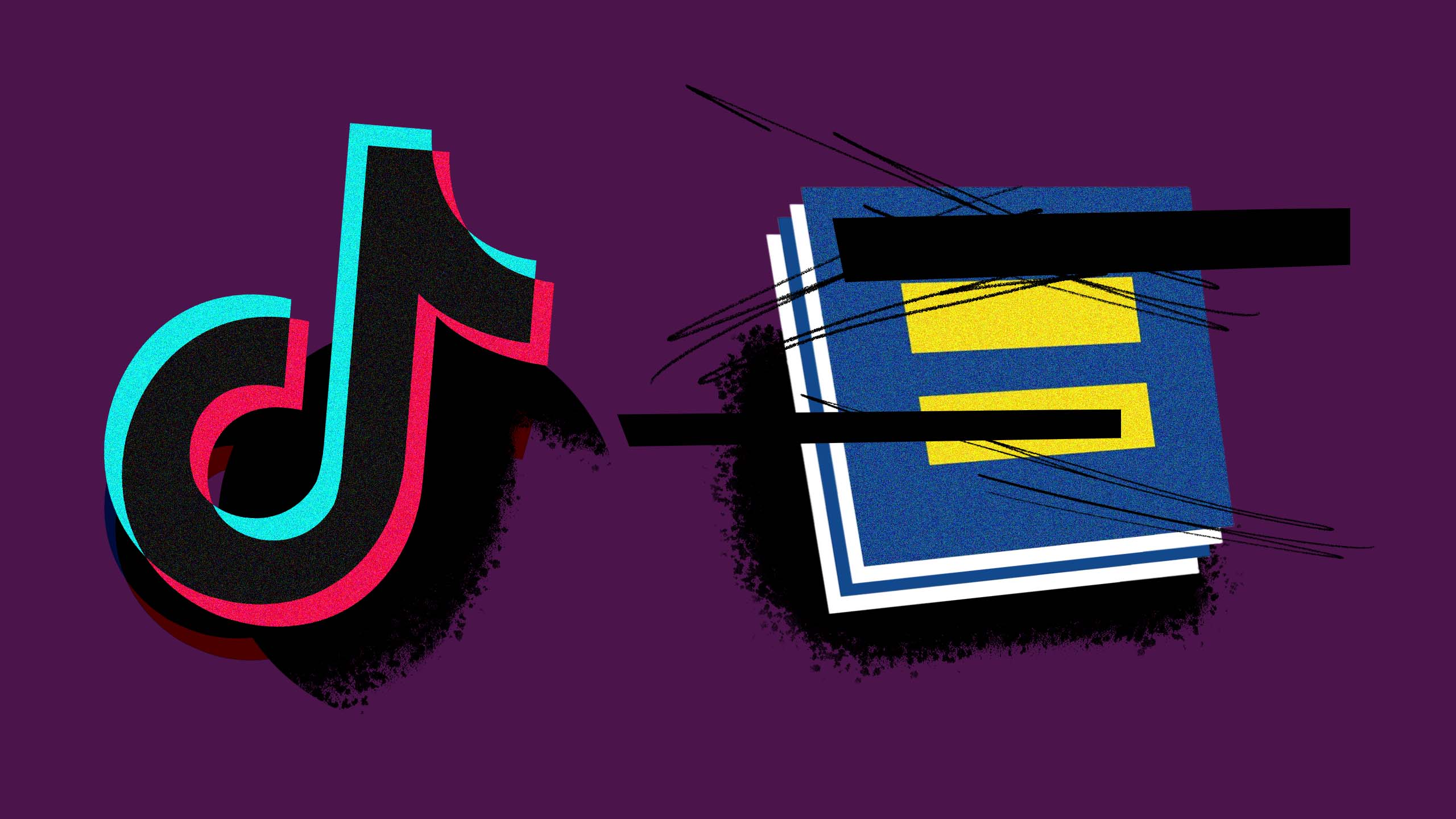America’s largest LGBTQ2S+ rights organization was suspended from TikTok for two days after simply commenting “GAY!” on another user’s account.
On March 30, the Human Rights Campaign (HRC) commented on a video showing a young person shouting “Gay!” as they crossed the state line into Florida. The footage was filmed in response to the state’s recently signed “Don’t Say Gay” law, which limits discussion of sexual orientation or gender identity in Florida schools. HRC responded to the video by replying “GAY!” along with a series of blue and yellow heart emoji.
Before it was reported and taken down, HRC’s comment received over 2,000 likes.
But soon after posting the reply, the national non-profit organization’s social media managers found that their account had been suspended for allegedly violating “community guidelines.” After appealing, the comment was restored, but the account’s posting abilities remained restricted.
While the initial suspension, which began on April 3, was originally scheduled to last until April 10, posting abilities were restored after the organization appealed the ban several times.
After inquiring into why their account had been suspended, HRC employees found out that it had also been reported on previous occasions. But as representatives of the organization tell Xtra, TikTok did not clarify which community guidelines HRC had allegedly violated or the reasons the group had been reported in the past.
Despite reaching out to TikTok for clarification on multiple occasions, HRC employees received no clarification as to why the account was suspended, apart from alleged “human error.”
HRC representatives say that the lack of accountability and explanation from TikTok is concerning given the broader landscape around LGBTQ2S+ equality. In the past month alone, states like Florida, Arizona and Alabama have passed restrictions on LGBTQ2S+ education in schools and the types of gender-affirming medical care that can be prescribed to trans youth.
“I think the thing that is frustrating for us is this is all taking place in an environment where state by state our rights are currently being taken away almost on a weekly basis—because of lies, misinformation, vitriol being spread by elected officials in the halls of power in places like Texas, Florida and Alabama,” says Ty Cobb, HRC’s senior director for strategic initiatives and research. “It doesn’t make sense why a comment like this would be pulled down and why the community is being censored in this way.”
Cobb adds that if HRC is being censored for posting pro-LGBTQ2S+ comments, it’s likely that it’s also happening to queer creators with smaller platforms. According to Cobb, that possibility is highly concerning, especially considering that they may have little recourse to address these issues directly with TikTok.
“It doesn’t make sense why a comment like this would be pulled down and why the community is being censored in this way.”
“Given the idea that this just came from ‘human error,’ the question is: How often is human error leading to these results?” he says. “And how often is human error leading to these results for queer content creators?”
This is far from the first time that TikTok has come under fire for how it manages LGBTQ2S+ content on its platform. Its notoriously opaque algorithm has been criticized for promoting homophobic and transphobic videos on its “For You” page, while a 2021 study from Media Matters showed an uptick in anti-LGBTQ2S+ content on the platform. Some videos identified by the progressive media watchdog directly advocated violence toward queer and trans people.
TikTok critics have argued the platform’s algorithm acts as an informal pipeline toward white supremacy. Another Media Matters study published last year found that users who engaged with transphobic content were more likely to be recommended videos espousing alt-right and racist ideas, sometimes within mere hours of engaging with the anti-LGBTQ2S+ media.
These findings have raised alarm among LGBTQ2S+ advocates given that the app’s user base generally skews younger than that of most other social networks. In 2020, TikTok reported that more than a third of its U.S. users were 14 years of age or under.
In response to the widespread criticism of its relationship to the LGBTQ2S+ community, the company announced earlier this year that it would include deadnaming, misgendering, misogyny and pro-conversion therapy advocacy in its list of actions that are banned under their content moderation policies.
TikTok’s revised content guidelines were reportedly developed in collaboration with GLAAD, which had previously criticized TikTok for allegedly failing LGBTQ2S+ users. In 2021, the media advocacy organization called the app an “unsafe” environment for queer and trans people and gave TikTok a failing grade on its now-annual Social Media Safety Index. (Facebook, Instagram, Twitter and YouTube also all received the same score in GLAAD’s survey.)
But HRC says that this recent incident indicates a need for greater investment from tech companies. It’s calling on platforms like TikTok to educate their content moderation teams on LGBTQ2S+ and ensure discrimination isn’t baked into the algorithm itself.
“Overall, I think there needs to be greater investment in content moderation, and how harmful content and misinformation is dealt with on each of the platforms,” Cobb says. “The companies that are involved here are all companies that are wildly successful. They are able to make those investments—and the investments have to get stronger.”


 Why you can trust Xtra
Why you can trust Xtra


